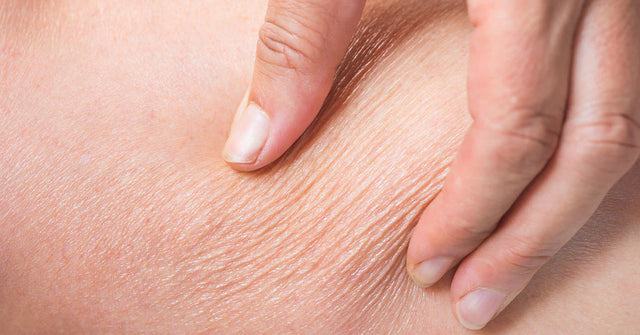Whether a greasy complexion is already an issue or not, you may notice that you sometimes get oily skin on your forehead, which gives it an unwanted sheen. Excess oil production sometimes concentrates in specific regions of the face, with the forehead being a key target.
In addition, environmental and lifestyle factors, including your skin and haircare routine, may lead to added oil production. However, the added grease above your nose is not an overwhelming issue. In this article, we’ll give you details about the root causes of an oily forehead and a long list of tips on how to manage the issue.
Why is My Forehead Oily?
What causes an oily forehead? Factors like hormone fluctuations, climate changes, new medications, genetics, and poor skincare habits can cause excess sebum production from the sebaceous glands. In addition, skin that becomes dry due to dehydration, overexposure to the sun, or aging may become oilier to compensate for the lack of moisture.
One specific cause of oily skin on the forehead may be greasy hair, especially if the strands hang on your face. For this reason, a new cut and modifying your hair hygiene routine and products could help significantly get rid of your forehead shine.
How to Manage Skin Oiliness on Your Forehead
Have you ever asked yourself, “Why is my forehead so oily, and how do I fix it?” Fortunately, there are several lifestyle solutions, skincare products, medications, and clinic treatments that could have a significant impact on lessening that added forehead sheen. Here are some of the best ways to manage oily skin on your forehead and the rest of your face.
Cleanse Daily
If you already have a greasy complexion, you must make cleansing twice daily a part of your regular skincare routine, using a light-quality, rich, organic product, and follow it up with a clarifying toner such as Maxatone to unclog the pores, soothe, refresh, decrease inflammation, and hydrate deeply.
It’s crucial to cleanse gently and remember that overdoing it could lead to dryness, which may cause excess oil production to compensate for the lack of moisture.
Use a Facial Mask
Adding a facial mask to your skincare routine once or twice a week for about 10-15 minutes can significantly help to prevent oily skin for a grease-free forehead. Begin by cleansing your skin as usual, then apply the mask according to the directions for the individual product.
Ingredients like mineral-rich clay and charcoal will absorb any extra oil on the skin’s surface, unclog the pores, and cleanse and rejuvenate your complexion. Facial masks can also help to balance moisture levels, preventing dryness which could ultimately lead to the overproduction of sebum.
Try Toners
Women sometimes neglect using a decent quality toner after cleansing, but if you have oily skin, it's crucial to incorporate it into your routine.
A rich, quality toner like Maxatone will remove dead skin cells and oils from your pores, shrinking their size and preventing excess sebum production, which could lead to an oily forehead. This formula also hydrates, preventing dryness, and is incredibly gentle on the complexion.
Use Blotting Papers
Most skincare companies sell blotting papers, which are very low in price and help absorb some of the extra oil your skin produces throughout the day. Even better, they reduce oiliness without ruining your makeup, so make sure you have some in your bag for those times during the day when your forehead is looking extra shiny!
You can use these papers several times daily to decrease the excess oil by pressing gently on the greasy area and then removing it without rubbing or scrubbing. This should get rid of the oil without irritating your skin.
Exfoliate
Are you wondering how to get rid of oily forehead shine? Exfoliating 2-3 times a week as part of your skincare routine is essential. This process removes extra oils, dirt, and dead skin cells from the pores, which unblocks them, preventing sebum production and acne breakouts.
While exfoliating is important if you have oily skin, you have to make sure you don’t overdo it, potentially stripping your skin of needed oils and drying out your complexion. This can ultimately have the reverse impact you wanted, leading to an increase in oil production to help compensate for it.
Applying Moisturizers
One of the causes of an oily complexion - and forehead - is skin dryness due to environmental and lifestyle factors or poor skincare hydration. It’s crucial to include a deeply moisturizing, rich skin cream like Dermaxsol in your twice-daily routine, no matter your skin type, especially if you suffer from an oily or dry complexion.
This cream is bursting with hydration forming a protective barrier to prevent moisture loss for long-lasting benefits. It’s soothing and non-greasy, so it won’t cause extra forehead shine! Dermaxsol also has SPF to protect you from UV rays and prevent damage and further dryness.
Clinic Treatments
If enhancing your skincare routine and health habits still doesn’t get rid of your oily forehead, consider meeting with a dermatologist to discuss some clinical treatments that could decrease your oily skin. In addition to following our tips for preventing shiny skin, some of these methods may be effective:
- Chemical Peel - In this procedure, the practitioner applies a solution that removes the top layer of your skin. This eliminates dead skin cells and reveals a fresh, healthy complexion underneath, and the deep exfoliation unclogs the pores to prevent extra sebum production.
- Microdermabrasion - In this procedure, the clinician uses a device on your skin that unclogs pores by removing dead skin cells, dirt, and oils. It also improves overall skin circulation, decreases swelling and inflammation, and promotes lymphatic drainage, slowing excess sebum production and limiting breakouts and oily skin.
- Laser Therapy - LED laser light therapy has numerous benefits for the skin, including decreasing inflammation, killing damaging bacteria, limiting breakouts, and balancing oil production. While traditionally a clinic treatment, there are now light therapy panels and facial masks available for home use on the market.
- Medication - In cases of severe oily skin, a dermatologist may prescribe a cream like tretinoin or adapalene. These are potent formulas for severe acne but may be used as needed on targeted areas like the forehead to decrease excess oiliness. Follow the doctor’s instructions exactly and do not overuse them.
- Botox - There is research indicating that injections of Botox into the skin can have a significant impact on decreasing excess sebum production and limiting oil production. If you have a greasy forehead or complexion, ask your physician if this is the right treatment for you.
Staying Hydrated
In addition to using a rich moisturizer, if you want to keep your skin hydrated and maintain an oil-free forehead, you must drink an adequate amount of water daily. Keeping hydrated throughout the day helps to balance the natural oils in your complexion and prevent overproduction.
Aim to consume about 8-10 full glasses daily for optimal skin benefits. Drinking water also stops your skin from becoming overly dry, so it’s one of the most important tips we can give you for preventing oily skin and reducing that forehead shine.
Prevention Tips For Oily Skin on Forehead
Besides the strategies already outlined for limiting oily skin on your forehead, we want to provide you with some key tips for preventing the issue which you may not have considered. There are some specific skincare mistakes that people make which can exacerbate oil production, but you can avoid them by following these methods:
Removing Makeup Before Sleeping
We can’t stress enough the importance of removing your makeup carefully before you go to bed with a product for this specific purpose. Many women think their regular cleanser is adequate, but more often than not, it will miss areas like the forehead, clogging the pores for excess sebum production and breakouts. If you wear makeup, begin your evening skincare routine with a good remover and then proceed with cleansing, toning, and moisturizing.
Don’t Use Harsh Chemicals For Your Skin
When you choose products for your skincare regimen, always pick items that contain 100% organic ingredients, with no toxic chemicals, parabens, sulfates, alcohol, fragrance, or other harmful additives or fillers which could irritate the complexion.
These substances may lead to skin breakouts and redness and could also dry out the skin, leading to excess overproduction of sebum to overcompensate.
Utilize Oil-Free Skin Products
Many skin care products rely on oils to hydrate and enrich the complexion, but these ingredients can exacerbate the problem. This is particularly true if your complexion is already greasy. The same is true of other cosmetics, so if you’re trying to reduce a shiny forehead, be sure that your facial products are all-natural and free of oils.
FAQs
Question #1 - Why is the skin on my forehead so oily?
Generally speaking, oily skin on your face could develop for multiple reasons, like hormone shifts, changes in weather, poor skin care, environmental factors, and genetics. Oily hair could also make your forehead greasy, especially if you have a cut that causes it to hang in your face.
If an oily forehead is a problem for you, both your skin and haircare routines are important in solving the issue. Use high-quality, oil-free products, wash your hair more often, and consider getting a cut that doesn't have your hair hanging across your forehead.
Question #2 - Why is my forehead oily all of a sudden?
If you notice a sudden increase in the oil production on your forehead, ask yourself if there have been any changes in your life that could have caused the issue. Examples may include menopause, a new medication, sudden climate shifts, or using a new skin or haircare product.
Furthermore, it might be time to reevaluate your daily skincare regimen if the products aren't serving well as they once did. Make sure you cleanse carefully, use a hydrating moisturizer twice daily, and exfoliate 2-3 times a week. Apply products gently without vigorous rubbing, and don't overdo it, as you could end up stripping your skin of key oils and creating added sebum production.
Question #3 - Why is my forehead so oily when I wake up?
People with an oily skin type may find that they wake in the morning with a greasy forehead and face, but it can also happen to people with other skin types. This extra morning shine could also develop as a result of dry skin.
If you don’t adequately hydrate your complexion before sleep, your skin could produce extra sebum to balance the moisture levels. Use a quality moisturizer or add a night cream to your regimen instead. An oily forehead in the morning could also occur if you have greasy hair hanging over your face during the night, so tie it back before you sleep to prevent this from happening.
Question #4 - Why is my forehead shiny but not oily?
While you may not have an oily skin type, it’s still possible to develop a shiny sheen on your forehead or other parts of your face during the day. This may be caused by excess sweat rather than oil, but other factors could also lead to extra oil production.
Some include dryness leading to excess sebum production, improper makeup removal causing clogged pores, over-cleansing, and over-exfoliating. There are also environmental elements like dust and pollution which could contribute to clogging the pores, leading to a shiny forehead at times from the excess oil production.
Key Takeaways
If you sometimes ask yourself, “Why is my forehead so greasy?” this article hopefully cleared up all your questions and concerns and provided you with some invaluable tips to help you manage the problem.
While there are clinical treatments and even medications available from the dermatologist, for the most part, keeping your forehead and the rest of your complexion oil-free and in optimal health only requires some simple changes to your lifestyle, skincare, and hair habits.
If you are trying to build the perfect daily skincare routine, have a look at our collection of rich organic products which cleanse, hydrate, soothe, exfoliate, and slow the production of excess sebum, to make sure your forehead (and your entire complexion!) glows with good health rather than shines.
Mentioned in this article
More stories

Skin Problems Over 60: How to Take Care of Your Skin




